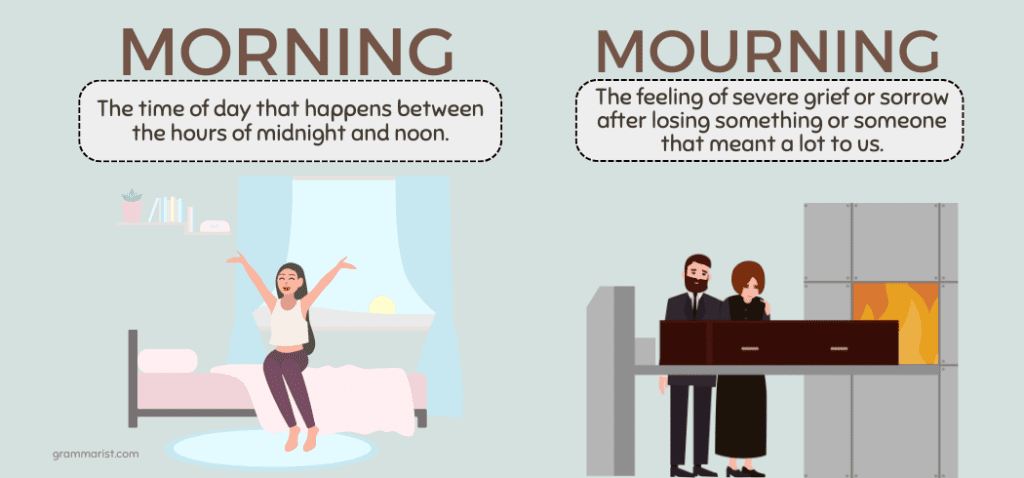I’m pretty sure homophones are here to torture us. But really, I know they create words with the same sound and pronunciation because the English language adapts words from different languages and origins, like morning and mourning, for example. Let’s take a look at the big differences between these two homophones.
Morning vs. Mourning

Let’s cut to the chase before I dive deep. Morning, without the U, means the beginning of the day. Mourning, with the U added in, is the term we all use to describe the process of grieving over the loss of something or someone.
What Does Morning Mean?
Morning is the time of day that happens between the hours of midnight and noon. We always associate it with when the sun comes up, but that’s actually dawn, which is part of the morning.
It’s also used as a way of saying or greeting good morning to someone. You could say good morning, but just the use of “morning” is enough in most contexts.
What Does Mourning Mean?
Mourning is a feeling or state of being we all experience at one point in our lives. It’s the feeling of severe grief or sorrow after losing something or someone that meant a lot to us. You can be mourning, and you also be in mourning.
It comes from an old English word murnan, which means expressing a deep feeling of regret, grief, or loss.
There’s also an old Norse root for the term called morna, which translates to “to pine away.”
Morning Etymology
The word morning derives from the old English words morwenynge, moregeninge, which basically means the start of the day.
How Do You Spell Morning?

If you’re talking about the time of day between midnight and lunchtime, then it’s m-o-r-n-i-n-g. But if you mean the term used to reference a state of grieving, then it’s m-o-u-r-n-i-n-g.
Using Morning in a Sentence
- Good morning! It’s such a lovely day, isn’t it?
- I need to get up early in the morning to make it to the bus.
- I absolutely loathe mornings; I’m more of a night person.
- Getting my kids up for school each morning is a pain.
- Morning is also the time period between dawn and noon.
- I love when the sun wakes me each morning and warms the pillow next to my head.
- I have to work until three in the morning.
Using Mourning in a Sentence
- My baby brother passed away over a year ago, and I still mourn his death.
- The loss of a child is something you’ll always be mourning.
- Let her be; give her a day of mourning.
- I’m mourning the loss of my youth as I grow closer to fifty.
- Back in the day, women wore black mourning attire or mourning dress for a month after their husbands died to show people they were grieving.
Morning and Mourning: There’s a Big Difference
So, you can clearly see why you shouldn’t mix up the definitions of these two words. While they sound the same, they have completely different meanings. Morning is the early time of day; mourning is the state of grief.
